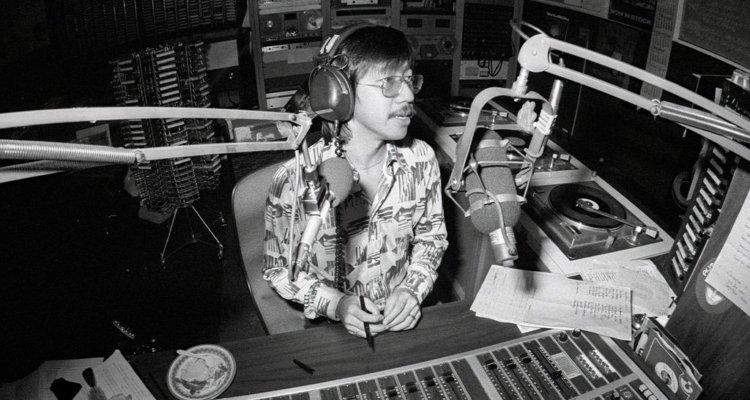You might know him best from Cameron Crowe’s seminal teenage road trip movie “Almost Famous.” Dressed replete in John Lennon glasses, long ink-black shaggy hair, and loud-open collar shirt, he is the editor from Rolling Stone Magazine who sends the intrepid Will on the road with the fictional band Stillwater. That man is Ben Fong-Torres. But the real personality, as with anything in Hollywood, runs starkly against the onscreen character. In fact, if you were to see Fong-Torres in the wild, his dry wit, affable and professional temperament would offer a dissimilar record to the hippy editor in Crowe’s movie who spouts the singular exclamation of “crazy.”
READ MORE: 2021 Tribeca Film Festival Preview: 15 Must-See Films To Watch & More
Fong-Torres’ life, if one can be so simple, is indeed crazy. The son of Chinese immigrants, he rose from his father’s simple Chinese restaurant to become a premiere rock interviewer and journalist, radio broadcaster, social activist, and editor of Rolling Stone Magazine. Along the way, he found immense love and profound heartbreak, and a guiding principle to get the story right. The director Suzanne Joe Kai’s intimate chronicle of his life, “Like A Rolling Stone: The Life & Times of Ben Fong-Torres,” aims to tell the real story behind a misrepresented yet captivating figure in rock history.
Early on in Kai’s 102-minute documentary, a colleague of the journalist describes Fong-Torres’ writing style: He first elucidates his subject and their work through a Q&A format. Then simply, seamlessly, his voice enters to set the scene, giving personal observations along the way. The format is now the standard of profile writing. And while Fong-Torres didn’t invent it, you could say he perfected the design.
READ MORE: The 100 Most Anticipated Films Of 2021
Kai’s film delicately meditates on the rock journalist’s life in a similar manner: At one moment, music legends like will late-Ray Manzarek of The Doors (Kai took years to cobble together the needed interviews for this film) or Sam Andrew from Big Brother and the Holding Company extol his passion and openness, his contemporaries such as David Felton, Jan Wenner, and Annie Leibovitz praise his expertise and kindness, and then to reset the scene, Fong-Torres reflects on his life, his family, and ethos. At first blush, the result is chaotic, barely tamp down by the film’s editors, but soon resolves to a balanced blend of revelatory stories from icons and grounded recollections of shared struggle and self-doubt.
The names of the featured icons drop like a thunderstorm. The audio of one-on-one interviews between Fong-Torres and the likes of Jim Morrison, Paul McCartney, Ray Charles etc., is sure to excite many music heads. Sometimes these discussions, taken from the stacks of tapes Fong-Torres owns, are siloed, seemingly disconnected from the writer’s personal story. Others hit the mark perfectly, specifically Ray Charles explaining the privileges afforded to white artists like Elvis, along with the everyday trauma wrought by Jim Crow laws.
READ MORE: Summer 2021 Preview: Over 50 Movies To Watch
See, Fong-Torres’ parents first arrived in America through inventive measures. At the time, the country disallowed immigration by Chinese people under the Chinese Exclusion Act. So, for his father to relocate, he needed to obtain Philippine papers and change his name (hence, the ‘Torres’ in ‘Ben Fong-Torres’). From there, at school, Fong-Torres faced racism, and later in life, at SF State covered the 1960s Counterculture and Civil Rights movements. Soon he found himself at an upstart San Francisco magazine you might have heard of, Rolling Stone, where he made his reputation as a tough but fair journalist. All the while, he took his role as a Chinese-American reporter seriously. As he candidly shares, for a time, he didn’t think he could become a writer because there were so few on the news who looked like him.
Fong-Torres’ favorite question to ask a subject is “tell me more.” And at every turn, Kai’s film taps the potential to tell us more. Fong-Torres’ dual responsibility to his family (tradition, really) and his job, his ways of melding the two together, accentuates what made him an adept storyteller. In addition, he has a natural affinity for empathy. At the height of his Rolling Stone tenure, for instance, he took an unpaid gig as a volunteer editor at East West, a bilingual Chinatown newspaper. There, he reported on the uptick in violence, gang activity, and systematic challenges in San Francisco’s Chinatown. During that time, he experienced intense loss too.
Kai smartly uses Fong-Torres’ story to recall the United States during the 60s: from the fleeting feelings of revolution in the air to the biting tragic reality of a flawed country. More than a tribute to the rock journalist or the musicians he helped make famous, “Like A Rolling Stone” first serves as a tribute to his family, his mother and father, and older brother Ben—whose love remains as strong as ever within him—for their sacrifices. This is a uniquely Chinese-American documentary. And an immersive film concerning the immigrant experience. It’s also a work that shows the humanism needed for great journalism to happen. “Like A Rolling Stone: The Life and Times of Ben Fong-Torres” is a must-see for every journalist, for any music fan, and for anyone who’s ever doubted their chances of success. [B+]
Follow along with all our 2021 Tribeca Film Festival coverage here.

